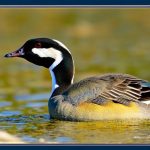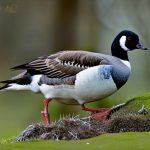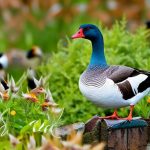Geese on boat docks can be a nuisance for many waterfront property owners. These large birds can cause damage to docks, leave behind droppings that are unsightly and unsanitary, and even pose a safety risk to people using the dock. Managing geese on docks is important not only for the well-being of the property owner but also for the overall health and balance of the ecosystem.
Key Takeaways
- Geese are attracted to boat docks because they provide a safe and elevated resting spot.
- Physical barriers such as netting or fencing can be effective in deterring geese from landing on docks.
- Visual deterrents such as decoys or reflective tape can also be used to keep geese away.
- Sound deterrents such as loud noises or predator calls can discourage geese from landing on docks.
- Removing food sources and maintaining a clean dock can help discourage geese from staying.
Understanding the behavior of geese on boat docks
Geese are attracted to boat docks for several reasons. Docks provide a safe and elevated platform for geese to rest, groom, and keep an eye out for predators. Additionally, docks often have nearby grassy areas or water sources that provide food and water for the geese. Understanding the behavior of geese on docks is crucial in order to effectively manage them.
When geese are on docks, they can exhibit territorial behavior, which means they may become aggressive towards humans or other animals that approach their space. They may also leave behind droppings that can be slippery and pose a safety hazard. Geese are social animals and tend to congregate in large groups, so once a few geese have found a dock to their liking, others are likely to follow.
Implementing physical barriers to deter geese
One effective way to manage geese on boat docks is by implementing physical barriers. There are several types of physical barriers that can be used, including netting, fencing, and spikes. Netting can be installed around the perimeter of the dock to prevent geese from landing or walking onto it. Fencing can also be used to create a physical barrier between the dock and the surrounding area, making it more difficult for geese to access the dock.
To install physical barriers effectively, it is important to ensure that they are secure and properly maintained. Netting should be tightly stretched and securely fastened to prevent geese from getting through or under it. Fencing should be tall enough to deter geese from flying over it, and any gaps or openings should be sealed to prevent geese from squeezing through. Spikes can be installed on the edges of the dock to make it uncomfortable for geese to land or walk on.
Using visual deterrents to keep geese away
Visual deterrents can also be effective in keeping geese away from boat docks. These deterrents work by creating a visual disturbance or threat that makes geese feel unsafe or uncomfortable. Some common visual deterrents include scarecrows, reflective tape, and predator decoys.
Scarecrows can be placed on or near the dock to create the appearance of a human presence, which can deter geese from landing. Reflective tape can be hung around the dock to create a visual disturbance that makes geese feel uneasy. Predator decoys, such as fake owls or hawks, can also be effective in deterring geese by creating the illusion of a potential threat.
To use visual deterrents effectively, it is important to regularly move them around and change their position. Geese can become accustomed to stationary deterrents and may eventually ignore them. By regularly moving and changing the position of visual deterrents, you can maintain their effectiveness in deterring geese.
Using sound deterrents to discourage geese from landing on docks
Sound deterrents can be another effective tool in discouraging geese from landing on boat docks. These deterrents work by emitting loud noises or sounds that are unpleasant or threatening to geese. Some common sound deterrents include propane cannons, ultrasonic devices, and recorded goose distress calls.
Propane cannons create loud bangs or explosions at regular intervals, which can startle and scare away geese. Ultrasonic devices emit high-frequency sounds that are unpleasant to geese but not audible to humans. Recorded goose distress calls can be played to create the illusion of danger or threat, causing geese to avoid the area.
To use sound deterrents effectively, it is important to vary the timing and frequency of the sounds. Geese can become accustomed to regular or predictable noises and may eventually ignore them. By varying the timing and frequency of sound deterrents, you can maintain their effectiveness in discouraging geese from landing on docks.
Removing food sources to discourage geese from staying on docks

One way to discourage geese from staying on boat docks is by removing their food sources. Geese are attracted to docks that have nearby grassy areas or water sources where they can find food. By removing these food sources, you can make the dock less appealing to geese.
Common food sources for geese on docks include grass, algae, and insects. Regularly mowing the grass around the dock can help discourage geese from landing and feeding. Additionally, treating any algae or weed growth in the water near the dock can reduce the availability of food for geese. Removing any standing water or stagnant pools can also help deter geese, as they rely on water sources for both drinking and feeding.
To remove food sources effectively, it is important to regularly monitor and maintain the area around the dock. Keep the grass mowed short and remove any weeds or algae growth in the water. Regularly check for standing water or stagnant pools and take steps to eliminate them.
Creating alternative habitats for geese to divert them away from docks
Creating alternative habitats for geese can help divert them away from boat docks. By providing an alternative location for geese to rest, feed, and find water, you can reduce their presence on the dock.
One way to create alternative habitats is by planting native vegetation that is attractive to geese in a designated area away from the dock. This can provide a natural food source for geese and encourage them to stay away from the dock. Additionally, providing a water source such as a small pond or bird bath can help divert geese away from the dock.
To create alternative habitats effectively, it is important to choose native vegetation that is suitable for the local climate and environment. Consult with a local landscaping professional or wildlife expert to determine the best plants to attract geese. Regularly monitor and maintain the alternative habitat to ensure it remains attractive to geese.
Maintaining a clean and tidy dock to discourage geese from landing
Maintaining a clean and tidy dock is important in discouraging geese from landing. Geese are attracted to docks that have food sources, such as crumbs or spilled food, as well as areas where they can rest or find shelter.
Regularly sweep or hose down the dock to remove any food debris or spilled food. Keep trash cans securely covered to prevent geese from accessing them. Additionally, regularly inspect the dock for any potential nesting sites, such as gaps or openings where geese could build a nest. Seal any gaps or openings to prevent geese from nesting on the dock.
To maintain a clean and tidy dock effectively, it is important to establish a regular cleaning and maintenance schedule. Regularly inspect the dock for any signs of geese or potential nesting sites. Clean up any food debris or spilled food immediately. By maintaining a clean and tidy dock, you can discourage geese from landing and reduce their presence.
Educating others on the importance of not feeding geese on docks
Educating others on the importance of not feeding geese on docks is crucial in managing geese populations. Feeding geese can create an artificial food source that encourages them to stay on the dock and can lead to an overpopulation of geese in the area.
Feeding geese on docks can also lead to other negative effects, such as increased aggression towards humans and other animals, as geese become dependent on handouts and may become territorial over their food source. Additionally, feeding geese can contribute to water pollution, as their droppings can contaminate the water and lead to an increase in harmful bacteria.
To educate others effectively, it is important to provide information on the negative effects of feeding geese and offer alternative ways to enjoy and appreciate these birds. Encourage others to observe geese from a distance and appreciate their natural behaviors. Provide educational materials or host community events to raise awareness about the importance of not feeding geese on docks.
Seeking professional help for persistent geese problems
In some cases, persistent geese problems may require the assistance of a professional. If other deterrent methods have been unsuccessful or if the geese population is causing significant damage or safety concerns, it may be necessary to seek professional help.
Professional wildlife management companies or local government agencies can provide expert advice and assistance in managing geese populations. They may be able to implement more advanced deterrent methods or provide guidance on obtaining necessary permits or licenses for geese management.
To find professional help, research local wildlife management companies or contact your local government agency responsible for wildlife management. Consult with multiple professionals to compare services and obtain quotes before making a decision.
Developing a long-term plan for managing geese on boat docks
Developing a long-term plan for managing geese on boat docks is important in maintaining a healthy and balanced ecosystem. Geese populations can fluctuate over time, and it is important to have a proactive approach to managing them.
A long-term plan should include regular monitoring of geese populations and behavior on the dock, as well as ongoing maintenance of deterrent methods. It should also include regular communication and education efforts to ensure that all dock users are aware of the importance of managing geese and following best practices.
To develop a long-term plan effectively, consult with wildlife experts or professionals who specialize in geese management. They can provide guidance on monitoring methods, deterrent techniques, and education strategies. Regularly review and update the plan as needed to adapt to changing geese populations or behaviors.
Managing geese on boat docks is important for the well-being of waterfront property owners and the overall health of the ecosystem. Understanding the behavior of geese on docks and implementing effective deterrent methods can help reduce their presence and minimize damage and safety risks. By removing food sources, creating alternative habitats, maintaining a clean and tidy dock, and educating others on the importance of not feeding geese, you can contribute to a healthier and more balanced environment. If persistent geese problems arise, seeking professional help and developing a long-term plan can ensure ongoing management and success in keeping geese away from boat docks. Take action today to manage geese on your dock and enjoy a cleaner, safer waterfront experience.
If you’re looking for effective ways to keep geese off your boat docks, you might also be interested in learning about how to build a portable chicken coop. Poultry Wizard offers a helpful article on chicken coop portage, which provides valuable insights on creating a movable coop for your chickens. By implementing the techniques mentioned in this article, you can easily relocate your chicken coop to different areas of your property, helping to deter geese from settling near your boat docks. Check out the article here for more information and practical tips.
FAQs
What are the common problems caused by geese on boat docks?
Geese can cause damage to boat docks by leaving droppings, feathers, and debris. They can also be aggressive towards humans and pets, and their presence can create a nuisance for boat owners.
What are some effective ways to keep geese off boat docks?
Some effective ways to keep geese off boat docks include installing bird netting, using decoys, applying repellents, and creating physical barriers. It is important to choose a method that is safe for both the geese and the environment.
Is it legal to harm or kill geese to keep them off boat docks?
No, it is not legal to harm or kill geese to keep them off boat docks. Geese are protected under federal and state laws, and it is important to find humane and non-lethal methods to deter them from the area.
What are some natural ways to keep geese off boat docks?
Some natural ways to keep geese off boat docks include planting vegetation that geese do not like, using noise deterrents such as wind chimes or horns, and using motion-activated sprinklers. These methods are safe for the environment and do not harm the geese.
How can boat owners prevent geese from nesting on their docks?
Boat owners can prevent geese from nesting on their docks by regularly cleaning the area to remove any debris or nesting materials, installing bird netting or physical barriers, and using decoys or repellents to deter geese from the area. It is important to start these prevention methods early in the season before geese begin nesting.
Meet Walter, the feathered-friend fanatic of Florida! Nestled in the sunshine state, Walter struts through life with his feathered companions, clucking his way to happiness. With a coop that’s fancier than a five-star hotel, he’s the Don Juan of the chicken world. When he’s not teaching his hens to do the cha-cha, you’ll find him in a heated debate with his prized rooster, Sir Clucks-a-Lot. Walter’s poultry passion is no yolk; he’s the sunny-side-up guy you never knew you needed in your flock of friends!







